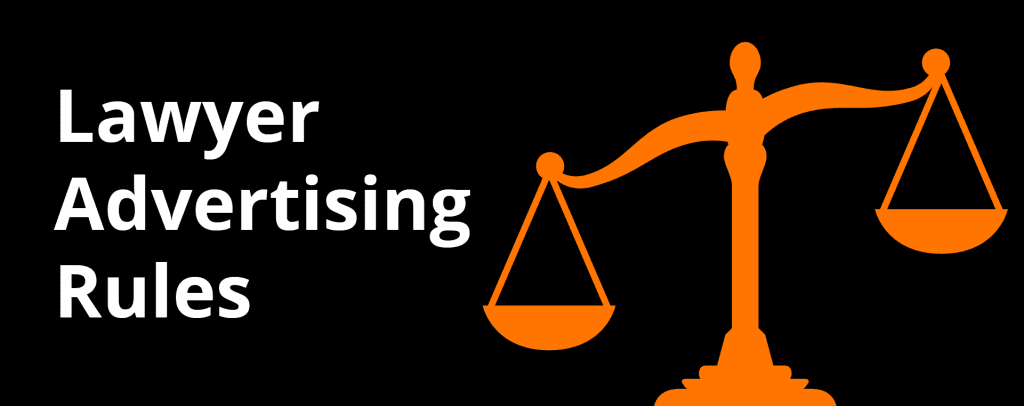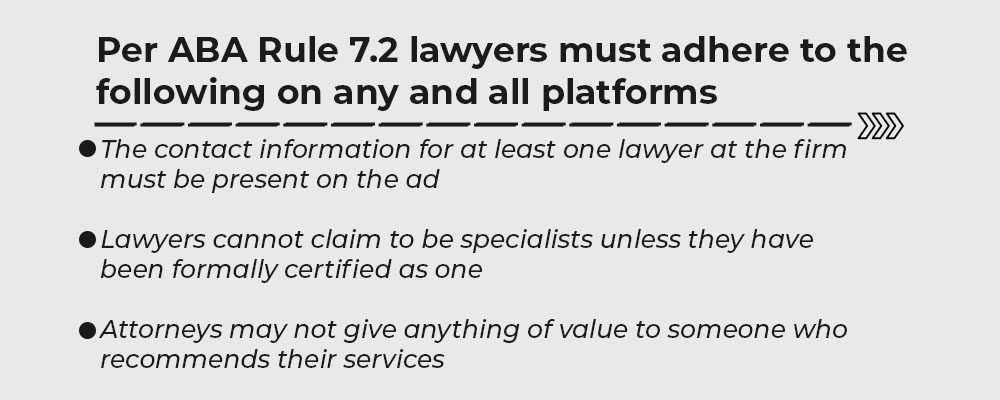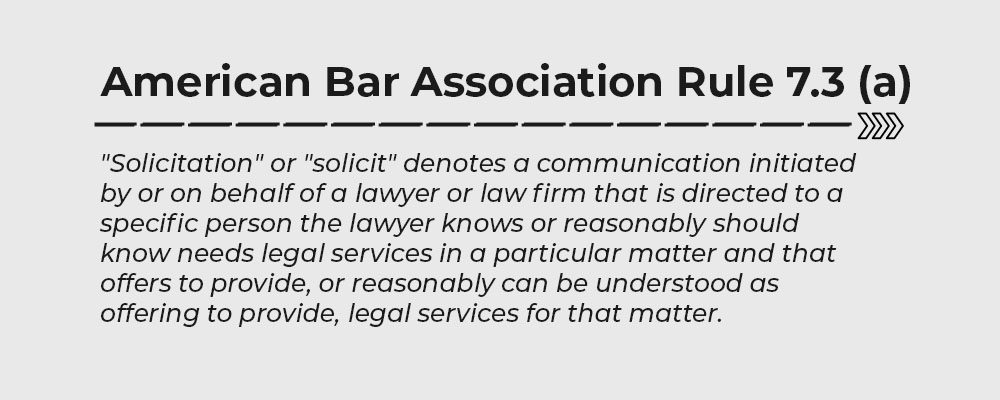
For a long time, lawyers weren’t permitted to promote their services in any way. The situation changed in 1977 when a Phoenix law firm advertised in a local newspaper. This was the basis for the famous Bates V. State Bar of Arizona case.
The majority of people today have seen various advertisements from lawyers, whether online, on billboards, or anywhere else. Some experts believe that lawyer advertising is a billion-dollar-a-year industry.
Advertising your legal services involves more than just placing your company’s name in the eyes of potential clients and grabbing their interest.
Every lawyer planning to market should be aware of the regulations and rules they must follow in all marketing efforts. Making the right choice between adhering to the rules and ensuring that your message stands out in the marketplace can be difficult.
Who Regulates Attorney Advertising?
Some major organizations have established guidelines regarding marketing and advertising. These rules determine the policy on advertising policy and the social media policies for law firms.
The American Bar Association sets national guidelines for what lawyers are allowed and should not do. However, lawyers could also be restricted in their states of operation. For instance, the New York attorney advertising rules are much more intricate.
As per ABA Regulation 7.2 on Communication Concerning Lawyer’s Service, Any platform can be used to promote lawyers; however, there are restrictions on what information can be communicated.

For instance, lawyers are required to adhere to these guidelines for any platform:
- The contact details that include at least one lawyer from the firm should be listed in the advertisement.
- Lawyers cannot assert that they are specialists until officially certified.
- Attorneys cannot offer any value to anyone who refers them to their services.
It is important to note differences between states and bar associations regarding laws and restrictions for legal marketing, advertising, and other activities.
If you manage a company with offices across multiple locations or states, review all pertinent information about the bar associations before launching any advertising campaigns.
There are many points to remember to remain in line with your daily routine. Keep these points in mind each time you try a new tactic, strategy, or method to reduce the chance of stepping in violation of current regulations.
#1. Avoid Misleading or Deceptive Statements

This is among the most difficult elements of marketing legal because what is considered deceitful or deceitful may appear different from one person to another. Always stay on the edge of caution.
Here are a few examples of statements that could be seen as deceptive or misleading in legal terms:
- We are the top/most successful legal firm in the X region.
- We’ll get you the things you’re due
- The traffic ticket lawyer with the lowest cost
Even if you believe your firm’s legal services are most effective or affordable, it’s not worth putting these adjectives in. Consider alternatives to the standard ones like “Affordable flat-fee services” or “A highly-rated law firm with hundreds of positive outcomes for clients.”
#2. Testimonials and Endorsements May Be Restricted
Testimonials and endorsements are effective word-of-mouth marketing tools for lawyers if used appropriately. But there are occasions when they should be controlled to avoid confusion or create false claims.
For instance, an attorney for personal injuries employing actors instead of real clients in a commercial might need to include a disclaimer that states that. In addition, since you cannot offer to anyone or induce people to leave reviews in exchange for something, as per the ABA guidelines, ensure that your clients leave reviews at their discretion.
State bar associations also are governed by their rules on what you may and cannot declare. Most often, this is related to disclaimers and specific language used in marketing.
For instance, many law firms use recent case outcomes or winning amount to strengthen their practices.
For South Carolina, New York, South Dakota, and Florida, However, attorneys must clearly state that past outcomes do not assure future results.
If you are a lawyer from South Dakota, North Dakota, New Jersey, or New York, you must be able to back up any claims you make in advertisements or endorsements with facts.
Charges, takedowns, or even disciplinary problems could result from not complying with the bar association’s marketing rules.
Certain state bars, including Texas state bars, such as Texas, permit lawyers to put up advertisements in advance for pre-approval to minimize the chance of issues related to compliance. In Nevada, the State Bar of Nevada will require lawyers to submit ads before the time of use.
Beyond the rules, be aware of sharing review details on other forums, which could make customers uncomfortable or reveal their identities.
3. Be aware of claims for specializations, expertise, or certifications.
Certain state bar associations provide specific designations for lawyers based on their particular area of work. These can be granted to an attorney on the basis of the length of time they have been practicing, the volume of cases handled, tests, and other certification methods.
Outside of state-approved state-ap, do not claim to be an expert or an expert on a specific subject.
For instance, you can review the laws of the attorney’s advertising rules in California to identify yourself as a “certified specialist” or a “certified specialist” lawyer.
4. Some States Require an Office Address to Advertise
If you are preparing to meet with a prospective client or a person with a concern to contact you, you might be required to provide your office address in your promotional materials.
In Florida, For instance, where you’re located, you’ll need an office address, and you must refer to it in some advertisements. If advertising in a specific region, you need an office address to accommodate customers.
Contact the state bar association to determine if they require this in your state.
5. Lawyers Cannot Directly Solicit

If you are preparing to meet with a prospective client or a person with a concern to contact you, you might be required to provide your office address in your promotional materials.
In Florida, For instance, where you’re located, you’ll need an office address, and you must refer to it in some advertisements. If advertising in a specific region, you need an office address to accommodate customers.
Contact the state bar association to determine if they require this in your state.
6. You May Be Required to Have Certain Detail in Your Ads
Certain state bar rules will require you to include information such as your contact details and bar memberships, as well as an indication of the communication as a form of advertisement.
Additionally, you may have to examine these guidelines to determine if you can include additional information, such as rates specific to the particular case or awards for law firms.
7. You May Not Be Able to Use a Trade Name
Although it is legal in many circumstances to use your company’s trade name, you should be cautious regarding what you include in advertisements for your law firm. Like New York, certain states do not allow law firms to market under trade names.
8. Restrictions on talking about the Competition
Distinguish yourself without breaking the law
- Subtly differentiate from competition.
- Highlight Client Commitment.
- Compare, but comply with rules.
- Emphasis unique value proposition.
One of the main reasons to promote is to get an advantage over other law firms in your area, but be careful when discussing them. Do not slander your competitors, and read the state bar’s rules concerning the limits of using comparisons in advertising for lawyers. However, in subtle ways, you can demonstrate how you differ from your competitors.
Maybe you don’t like the local personal injury firm’s commercials on television. Instead of pointing them directly, you could consider running an online ad claiming that you depend on client testimonials instead of excessive, loud commercials.
You could also talk more generally about matters such as answering phone calls for clients by stating in your advertisements that you value your customers and are committed to keeping them up to date. This can highlight the potential weaknesses of your Competition while establishing your company as the better option.
Although the FTC claims that comparative marketing can be beneficial, you must still comply with state, local, and federal laws. Ensure you can prove your claims about your business or any other firm. If you’re spending money on advertising, you should focus on your distinctive value offering and not distort your message with attempts to draw comparisons with other companies in the first place.
9. Some Jurisdictions Require You to Retain Advertising Records
There are many reasons to save copies of your ads, such as re-examining the previous campaigns and ensuring compliance with the state’s rules regarding keeping proper records.
Many lawyers are familiar with their state, which requires them to keep client records for a specific period. However, some states go the extra step and make lawyers keep copies of advertisements in their files. New York, for example, has lawyers keep copies of ads on digital media for one year and physical ads for three years.
Is Marketing and Advertising Worth it For Attorneys?
There is a chance that advertising has no value if you make so many hurdles. However, these rules are relatively simple to master, especially if you develop a checklist of rules and etiquette for your or your law firm’s marketing manager or consultant.
Even with these limitations, there are numerous benefits in advertising and marketing to your legal firm.
Lawyers who know these rules know what they can or cannot say and collaborate with partners who know the rules, too.
For instance, if you’re hiring a lawyer firm expert in SEO, they shouldn’t just be aware of these guidelines and remain dedicated to observing the rules at all times. It is important to review all advertisements and marketing materials before release in case they fall too close to the mark.
Many law firms have found ways to design and create constant and unique advertisements and marketing materials that do not violate laws.
Market Effectively and Ethically
There are many ways to create effective marketing and advertisements with a great message to your firm’s law practice. When in doubt, stay vigilant about any activity that may be taken to mean making promises or false assertions. Always adhere to the federal and state guidelines of the bar association.
If you’re unsure about something, and your state bar permits pre-approval, use this instead of dealing with the ethics or compliance issue in the future.
Select your partners with care when outsourcing any aspect of your marketing. Strategies or marketing messages that work in other fields could overcome ethical guidelines for lawyers.
When hiring an outside marketing company, pick a team similar to the experts from Revoltsinc.com. Our experts have been working in the legal sector for a long time and understand the importance of creating engaging marketing campaigns and content that do not violate any rules.

